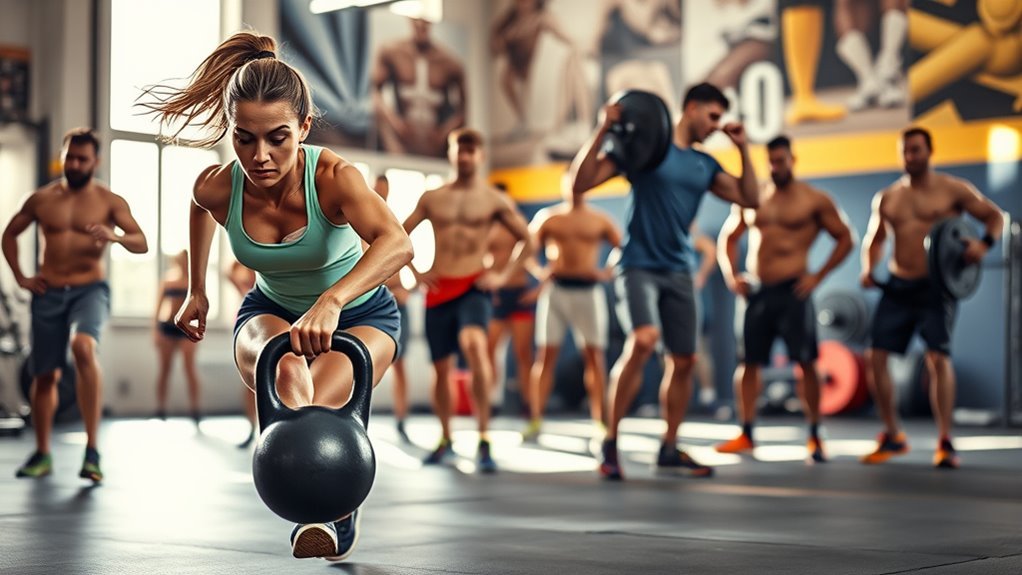Functional fitness matters for all athletes because it enhances performance and reduces injury risk. By engaging multiple muscle groups through movements that mimic everyday activities, you improve strength, agility, and coordination. This training helps you tackle physical demands in different sports, making your body more adaptable. Plus, it can boost core strength and stability, which is essential for maintaining good posture and balance. Keep exploring to discover how functional fitness can transform your athletic journey.
Understanding Functional Fitness
When you think about fitness, it's easy to get caught up in traditional workouts that focus on isolated muscles. But functional fitness takes a different approach. It emphasizes movements that mimic everyday tasks, allowing your body to work as a cohesive unit. Imagine swinging a bat or sprinting on the field; these actions require not just strength but coordination, balance, and agility.
Functional fitness is about empowering you to move freely and confidently in your daily life and sport. By engaging multiple muscle groups and joints, it enhances your overall performance and reduces the risk of injury. You're not just building strength; you're developing skills that translate into real-world activities. Incorporating functional mobility and flexibility drills into your routine can further enhance your athletic performance. So, if you want to break free from the confines of conventional training, embracing functional fitness might just be the key to releasing your full athletic potential. It's time to move better, feel better, and live better.
The Benefits of Functional Training
Functional training isn't just about looking good; it's about enhancing your daily performance and preventing injuries. By focusing on movements that mimic real-life activities, you'll feel stronger and more agile in your everyday tasks. Plus, with the right strategies, you can considerably reduce your risk of injury, keeping you in the game longer. Incorporating mobility training into your routine can further enhance your performance and flexibility, allowing for more efficient movement.
Enhanced Daily Performance
Although many athletes focus on sport-specific training, incorporating functional training can greatly enhance your daily performance. By developing strength, balance, and flexibility through movements mimicking real-life activities, you'll find yourself more agile and capable in everything you do. Whether it's lifting groceries, climbing stairs, or playing with friends, functional training boosts your overall strength and endurance. You'll notice that everyday tasks become easier, allowing you to enjoy your freedom more fully. Plus, increased core stability improves your posture, making you feel more confident and capable in any situation. Embracing functional fitness not only empowers your athletic pursuits but also enriches your daily life, giving you the energy and liveliness to pursue what truly matters.
Injury Prevention Strategies
Improving your daily performance isn't just about feeling good; it's also about staying injury-free. Functional training equips you with the tools to enhance your body's resilience. By mimicking real-life movements, you strengthen the muscles that stabilize your joints, reducing the risk of injury during sports or daily activities. Incorporating exercises like squats, lunges, and kettlebell swings not only boosts strength but also improves coordination and balance. These are essential for preventing falls and strains. Plus, by focusing on flexibility and core strength, you create a solid foundation that allows for greater freedom of movement. Embrace functional fitness, and you'll not only perform better but also enjoy a more active, injury-free lifestyle. Your body will thank you for it!
Enhancing Athletic Performance
When you focus on functional fitness, you're setting yourself up for enhanced athletic performance. You'll notice improvements in strength, power, agility, and coordination, all of which are essential for your sport. Plus, building your endurance and stamina can help you outperform the competition when it matters most. Incorporating plyometric exercises into your routine can further boost your speed and agility, making you a more dynamic athlete on the field.
Improved Strength and Power
As you endeavor to enhance your athletic performance, focusing on improved strength and power can make a significant difference in your overall capabilities. Building strength not only boosts your muscle power but also supports better endurance, allowing you to perform at your best for longer periods. When you increase your power, you'll notice explosive movements become easier, whether you're sprinting, jumping, or lifting. Functional fitness exercises, like kettlebell swings and squats, engage multiple muscle groups, mimicking real-life movements and fostering a more balanced physique. This holistic approach to training helps prevent injuries, allowing you the freedom to push your limits without fear. Embrace strength and power training, and you'll reveal your true athletic potential. Your body will thank you!
Increased Agility and Coordination
Building on your strength and power gains, increased agility and coordination are essential for enhancing your athletic performance. These skills help you move more freely, react faster, and make split-second decisions during your sport. When you integrate functional training, you're not just building muscles; you're improving how your body works as a whole.
| Agility Exercise | Coordination Exercise | Benefits |
|---|---|---|
| Ladder Drills | Balance Beam | Improved footwork |
| Cone Drills | Juggling | Better hand-eye sync |
| Side Shuffles | Medicine Ball Toss | Enhanced body control |
| Plyometric Jumps | Single-Leg Stands | Greater stability |
| Shuttle Runs | Agility Hurdles | Faster directional changes |
Embrace these elements to release your full potential as an athlete!
Enhanced Endurance and Stamina
To excel in your sport, you need enhanced endurance and stamina, which are essential for sustaining energy levels during intense competition. Functional fitness training focuses on movements that mimic your sport, boosting your cardiovascular efficiency and muscular endurance. By incorporating high-intensity interval training, circuit workouts, and dynamic exercises, you'll not only build stamina but also improve your overall performance.
This type of training allows you to push your limits, helping you break through barriers you never thought possible. You'll find yourself feeling more energetic and less fatigued, giving you the freedom to play longer and harder. Embrace this journey, and watch how enhanced endurance transforms not just your game, but your entire athletic experience. Freedom in sport comes from the ability to perform without limits.
Injury Prevention Through Functional Movements
While many athletes focus on strength and endurance, incorporating functional movements into your training can greatly reduce the risk of injury. These movements mimic everyday activities, enhancing your body's ability to move efficiently and safely. When you prioritize functional fitness, you're not just building muscle; you're building resilience.
Consider these key benefits:
- Improved Stability: Strengthening core muscles helps maintain balance and prevents falls.
- Enhanced Flexibility: Functional movements promote a greater range of motion, reducing strain on muscles and joints.
- Joint Protection: By engaging multiple muscle groups, you distribute stress evenly, lowering the risk of overuse injuries. Additionally, prioritizing joint health allows for harder training and faster recovery.
- Better Movement Patterns: Training with functional movements fosters proper biomechanics, making you less prone to injury during sports or daily activities.
Embrace functional fitness, and give yourself the freedom to perform without fear of injury. Your body will thank you!
Functional Fitness for Everyday Life
Functional fitness isn't just for athletes; it's essential for everyone looking to enhance their daily life. By incorporating functional movements into your routine, you can improve your strength, flexibility, and balance, making everyday tasks easier and more enjoyable. Imagine lifting groceries, playing with your kids, or even gardening without feeling exhausted or strained.
Here's a quick look at how functional fitness can benefit you:
| Activity | Functional Fitness Benefit |
|---|---|
| Lifting groceries | Builds strength for heavy objects |
| Climbing stairs | Improves leg strength and endurance |
| Playing with kids | Boosts agility and coordination |
| Cleaning the house | Enhances overall mobility |
| Gardening | Increases flexibility and stamina |
Incorporating exercises like squats and lunges can significantly enhance your functional fitness, allowing you to perform daily activities with greater ease. Embrace functional fitness, and you'll gain the freedom to enjoy life's activities without limitations. It's about making your day-to-day experiences richer and more fulfilling.
Core Strength and Stability
Everyday activities rely heavily on a strong core, which plays a vital role in overall functional fitness. When your core's strong and stable, you can move more freely and confidently, whether you're lifting groceries or hitting the gym. A solid core enhances your balance, reduces injury risk, and improves your athletic performance.
Core strength acts as the foundation of athletic performance, allowing for more efficient and powerful movements in both sports and daily activities.
Here are some benefits of developing core strength and stability:
- Improved posture: A strong core helps maintain alignment during various activities.
- Enhanced balance: Stability in your core translates to better control over your movements.
- Injury prevention: A well-conditioned core supports your spine and reduces strain on muscles.
- Increased power: A stable core allows for powerful movements in sports and daily life.
Adaptability for Different Sports
Athletes need to be versatile, as different sports demand unique physical demands and skills. Functional fitness equips you with the adaptability to shift seamlessly between various activities. Whether you're sprinting on the track, diving into the pool, or tackling on the field, your body needs to respond effectively to diverse challenges. This adaptability is greatly enhanced through agility training techniques that can improve your performance in multiple sports.
Here's how functional fitness applies across different sports:
| Sport | Key Functional Skills |
|---|---|
| Soccer | Agility, balance, endurance |
| Swimming | Core strength, flexibility |
| Weightlifting | Power, stability, coordination |
Incorporating Functional Fitness Into Your Routine
How can you seamlessly integrate functional fitness into your training routine? Start by incorporating movements that mimic real-life activities and enhance your athletic performance. Here are some tips to help you get started:
- Prioritize compound movements: Focus on exercises like squats, deadlifts, and push-ups that engage multiple muscle groups simultaneously.
- Use bodyweight exercises: They're versatile and can be done anywhere, giving you the freedom to train without a gym. These exercises also enhance core stability, which is crucial for maintaining control and balance during athletic movements.
- Incorporate balance and stability work: Exercises like single-leg deadlifts or stability ball workouts can improve your core strength and coordination.
- Add functional equipment: Utilize kettlebells, resistance bands, or medicine balls to add variety and challenge your muscles differently.
Success Stories: Athletes Who Embrace Functional Fitness
While many professionals recognize the importance of functional fitness, some standout athletes have truly embraced it, transforming their training and performance. Take, for instance, a champion sprinter who integrated kettlebell swings and bodyweight exercises into her routine. By focusing on movements that mimic her racing mechanics, she not only improved her speed but also reduced the risk of injury.
Another inspiring example is a professional basketball player who adopted functional training to enhance his agility and strength on the court. Instead of just lifting weights, he now practices movements that reflect game situations, giving him a competitive edge. Incorporating full-body strength exercises into his regimen has further boosted his overall power.
These athletes show that functional fitness isn't just a trend; it's a powerful tool that can release your potential. By prioritizing functional movements, you can experience greater freedom in your performance, whether you're sprinting, jumping, or pivoting. Embracing this approach could be the key to your own success story.
Frequently Asked Questions
What Equipment Is Best for Functional Fitness Training?
For functional fitness training, kettlebells, resistance bands, and medicine balls are great options. They help you build strength, improve mobility, and enhance overall performance. Just pick what suits your goals and enjoy your workouts!
How Often Should I Incorporate Functional Fitness Into My Routine?
Incorporating functional fitness three to four times weekly can boost your performance; studies show athletes improve 20% faster. Mix it into your routine, and you'll feel freer, more agile, and ready for any challenge.
Can Functional Fitness Help With Weight Loss?
Absolutely, functional fitness can aid in weight loss by boosting metabolism and building lean muscle. It keeps your workouts engaging, helping you burn calories effectively while enhancing your overall strength and endurance to achieve your goals.
Is Functional Fitness Suitable for Beginners?
Yes, functional fitness is perfect for beginners! It emphasizes natural movements, making it accessible and effective. You'll build strength and endurance while improving everyday activities, all in a supportive environment that encourages your personal growth.
How Do I Track Progress in Functional Fitness?
To track progress in functional fitness, you could log your ability to lift heavier weights over time. Each week, note improvements; it's empowering to see how you're becoming stronger and more capable in daily life tasks.




